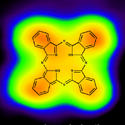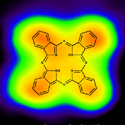Organic spin filters
While organic materials are widely used in electronic devices such as LEDs and photovoltaics, the idea of incorporating organic molecules into spintronic devices remains in its infancy. To stimulate progress in this exciting new field, a more detailed understanding is needed of the electronic and magnetic properties of organic molecules adsorbed on ferromagnetic surfaces.
In a paper appearing in Physical Review Letters, Nicolae Atodiresei and colleagues at the Forschungszentrum Jülich and collaborators at the University of Hamburg, both in Germany, address this issue using spin-polarized scanning tunneling microscopy (STM) and density functional calculations for organic molecules adsorbed on a magnetic iron-tungsten surface. They show that while the adsorbed molecule’s magnetic moment remains negligible, the occupied and unoccupied states just below and above the Fermi level are spin polarized. Surprisingly, this spin polarization induced in the molecule is opposite to that of the underlying metal film, and the degree of the spin polarization depends systematically on the strength of the bonding between the molecule and the surface. The spin polarization of states near the Fermi level makes the molecule act as a spin filter for electrons, which are supplied by the STM tip in the present work, but the tip could be replaced in the future by appropriate device structures. – Jonathan Mallett





